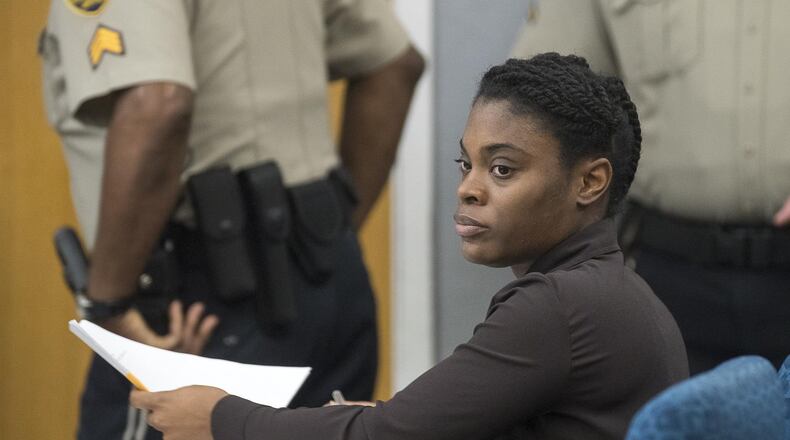Jury selection continued Tuesday in the death-penalty trial against Tiffany Moss, a Gwinnett County woman accused of starving her 10-year-old stepdaughter to death in 2013.
Moss, 35, has refused representation by two experienced attorneys from the state capital defender office and is serving as her own lawyer. On Tuesday, more than a dozen prospective jurors appeared in court and individually answered questions about their views to see if they can be qualified as fair and impartial.
Moss had only a few questions for the prospective jurors, often declining to ask anything at all. When it was their turn, District Attorney Danny Porter and Assistant District Attorney Lisa Jones asked numerous questions to each of the jurors, exploring their views on capital punishment and their backgrounds.
On one occasion, Moss won a motion to keep a woman in the pool of potential jurors when the jury is ultimately selected.
This woman, Juror No. 30, had acknowledged to Porter that she had signed petitions opposing capital punishment.
“I’m personally not a fan of it,” said the woman, a veterinary nurse. “… It’s hard to sleep at night making that decision.”
Porter then asked her if she believed she could consider all three sentencing options — life in prison with the possibility of parole, life without parole or the death penalty — if she was selected as a juror in the case.
“I would like to think I could,” she said.
Under the law, potential jurors are to be excused from service in a death-penalty trial if they say they cannot impose a death sentence. So Porter continued to question her.
As he did, the woman admitted to having bad experiences with the criminal justice system.
Once on her birthday when she was a teenager, she said, she shot a water pistol out of a car window and the water hit a taxi driver in the face. The taxi driver feared it was a terrorist assault, and the woman wound up handcuffed by police and threatened with an aggravated assault charge, she said.
“It was not my favorite birthday,” the woman said. “I was a dumb teenager.”
She said she was never formally charged.
Juror No. 30 also told Porter she believed a friend of hers was wrongly convicted of a sexual assault, for which he received a 10-year prison sentence.
“I don’t have a lot of faith in it,” she said of the criminal justice system, citing a “lack of consistency.”
Porter then asked Juror No. 30, given her views and life experiences, whether she could truly vote for the death penalty.
“I’ve been against it for so long,” the woman said, equivocating.
After Juror No. 30 stepped out of the courtroom, Porter moved to have her excused. He cited her opposition to capital punishment and her problems with the criminal justice system.
When Hutchinson turned to Moss, she rose from the defense table and objected. Juror No. 30 had said if she were selected as a juror and heard all the evidence, she could consider all three sentencing options, including the death penalty, Moss said.
Hutchinson agreed, granting Moss a small victory. “She will not be excused for cause,” the judge said, keeping her in the pool.
Later, when she did question a prospective juror, Moss exchanged laughter with Juror No. 25 before she asked him a sobering question.
Prosecutors have alleged that Moss starved her stepdaughter, Emani Moss, to death during a 10-day period from late October to early November 2003. They also say Moss tried to hide Emani’s death by burning her body and leaving it in a garbage disposal.
“You like to listen to the facts first, then think about punishment,” Moss told Juror No. 25, a mortgage broker, repeating what he’d just told Porter.
If you find me guilty of “starving her and burning her body,” can you still consider a possible sentence of life with the possibility of parole? Moss asked.
“Depending on the facts and the evidence, I would consider three (sentencing options), absolutely,” he answered.
“In that case, you answered all my questions,” the smiling murder defendant said.
The jury selection process is expected to take most, if not all, of this week. Opening statements and testimony are expected to begin early next week.
About the Author
The Latest
Featured


